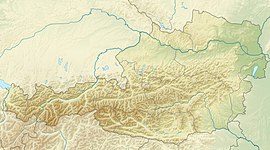Mittelberg
Mittelberg | |
|---|---|
 | |
 Location in the district | |
| Coordinates: 47°19′22″N 10°09′20″E / 47.32278°N 10.15556°E | |
| Country | Austria |
| State | Vorarlberg |
| District | Bregenz |
| Government | |
| • Mayor | Andi Haid (Offene Bürgerliste und Volkspartei Kleinwalsertal) |
| Area | |
• Total | 96.82 km2 (37.38 sq mi) |
| Elevation | 1,200 m (3,900 ft) |
| Population (2018-01-01)[2] | |
• Total | 4,962 |
| • Density | 51/km2 (130/sq mi) |
| Time zone | UTC+1 (CET) |
| • Summer (DST) | UTC+2 (CEST) |
| Postal code | 6991, 6992, 6993 (Austria) 87567, 87568, 87569 (Germany) |
| Area code | 05517 |
| Vehicle registration | B |
| Website | GDE-Mittelberg.at |
Mittelberg is a municipality and a village in the district of Bregenz in the Kleinwalsertal, in the Austrian state of Vorarlberg. It is accessible by road only from Germany.
Geography
The largest stream in the municipality is the Breitach which originates in Baad and flows through all three villages of Mittelberg, Hirschegg and Riezlern. It receives water of the side streams such as Derrabach, Turabach, Bärgundbach, Gemstelbach and Wildenbach.
The main mountains of Mittelberg include Elfer (2387 m) Bärenkopf (Allgäu Alps) (2083 m), Walmendingerhorn (1990 m), Grosser Widderstein (2536 m) and Zwölfer (2224 m).
Kleinwalsertal is a valley that is accessible by road only from Germany.
History
Mittelberg was settled around 1300 by five Walser families from Tannberg coming across over the Hochalppass. The first houses were probably in Bödmen, a district of Mittelberg. The settlers inherited the land from the Swabian Counts of Rettenberg. The valley initially belonged to the Walser court of Tannberg but in 1563 the valley was awarded its own court in Mittelberg, which existed until 1807.[3]
Population
Although it is not an exclave in a strict sense (it is contiguous with the rest of Austria), its geographic position creates a special situation for inhabitants and visitors. For instance, it has both Austrian and German postal codes. Since 1891 Kleinwalsertal has been in the German customs union, and has an open border with that country.[4]
Before the introduction of the Euro, the Deutsche Mark was used there. Since Austria joined the European Union (1995), the Schengen Agreement was ratified (1997), and the Euro was introduced (2002), this special status no longer applies.[citation needed] However, due to its location several taxation differences apply, such as a lower VAT rate.[citation needed]
| Year | Pop. | ±% |
|---|---|---|
| 1869 | 1,500 | — |
| 1880 | 1,398 | −6.8% |
| 1890 | 1,282 | −8.3% |
| 1900 | 1,187 | −7.4% |
| 1910 | 1,267 | +6.7% |
| 1923 | 1,599 | +26.2% |
| 1934 | 1,944 | +21.6% |
| 1939 | 2,209 | +13.6% |
| 1951 | 2,830 | +28.1% |
| 1961 | 3,557 | +25.7% |
| 1971 | 3,980 | +11.9% |
| 1981 | 4,599 | +15.6% |
| 1991 | 5,038 | +9.5% |
| 2001 | 4,717 | −6.4% |
| 2011 | 4,982 | +5.6% |
Education
Kindergartens:
In popular culture
Mittelberg was the setting of "The Final Reich," one of the levels of Call of Duty: World War II: Nazi Zombies.
See also
- Horizon Field, 2010 sculpture installation by Antony Gormley.
References
- ^ "Dauersiedlungsraum der Gemeinden Politischen Bezirke und Bundesländer - Gebietsstand 1.1.2018". Statistics Austria. Retrieved 10 March 2019.
- ^ "Einwohnerzahl 1.1.2018 nach Gemeinden mit Status, Gebietsstand 1.1.2018". Statistics Austria. Retrieved 9 March 2019.
- ^ mb (n.d.). "Mittelberg Geschichte und Brauchtum". Gemeinde Mittelberg. Retrieved 20 June 2022.
- ^ "Regulation (EEC) No 1496/68 of the Council of 27 September 1968 on the definition of the customs territory of the Community". Publications Office of the European Union. Retrieved 21 August 2021.
- ^ "Kindergarten Hirschegg." Mittelberg. Retrieved on January 6, 2018.
- ^ "Kindergarten Mittelberg." Mittelberg. Retrieved on January 6, 2018.
- ^ "Kindergarten Riezlern." Mittelberg. Retrieved on January 6, 2018.




